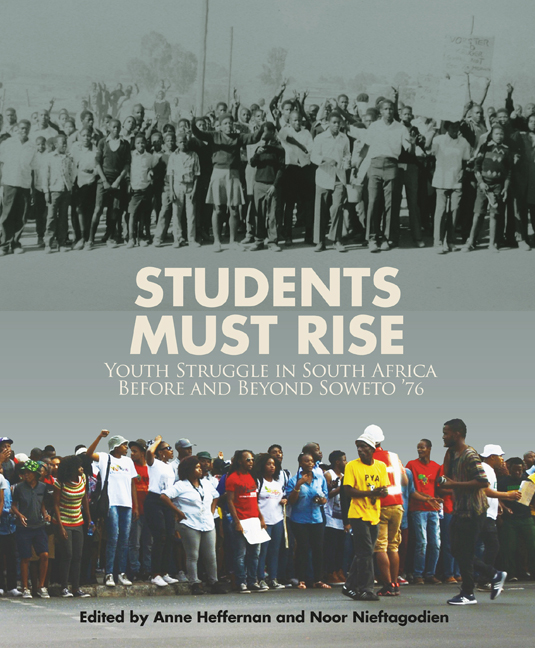Book contents
- Frontmatter
- Acknowledgements
- Contents
- Timeline
- Map Of South Africa
- Glossary
- Abbreviations
- Introduction: narratives of the student struggle
- Chapter 1 A brief history of the African Students’ Association
- Chapter 2 Youth and student culture: Riding resistance and imagining the future
- Chapter 3 The role of religion and theology in the organisation of student activists
- Chapter 4 Student organisation in Lehurutshe and the impact of Onkgopotse Abram Tiro
- Chapter 5 The University of the North: A regional and national centre of activism
- Chapter 6 Action and fire in Soweto, June 1976
- Chapter 7 What they shot in Alex
- Chapter 8 SASO and Black Consciousness, and the shift to congress politics
- Chapter 9 Youth politics and rural rebellion in Zebediela and other parts of the “homeland” of Lebowa, 1976–1977
- Chapter 10 My Journey, our journey: Activism at Ongoye University
- Chapter 11 ‘Let's begin to participate fully now in politics’: Student politics, Mhluzi township, 1970s
- Chapter 12 ‘They would remind you of 1960’: The emergence of radical student politics in the Vaal Triangle, 1972–1985
- Chapter 13 The ends of boycott
- Chapter 14 Fighting for ‘our little freedoms’: The evolution of student and youth politics in Phomolong township, Free State
- Chapter 15 ‘Every generation has its struggle’: A brief history of Equal Education, 2008–15
- Chapter 16 Contemporary student politics in South Africa: The rise of the black-led student movements of #RhodesMustFall and #FeesMustFall in 2015
- Selected Bibliography
Chapter 12 - ‘They would remind you of 1960’: The emergence of radical student politics in the Vaal Triangle, 1972–1985
Published online by Cambridge University Press: 21 April 2018
- Frontmatter
- Acknowledgements
- Contents
- Timeline
- Map Of South Africa
- Glossary
- Abbreviations
- Introduction: narratives of the student struggle
- Chapter 1 A brief history of the African Students’ Association
- Chapter 2 Youth and student culture: Riding resistance and imagining the future
- Chapter 3 The role of religion and theology in the organisation of student activists
- Chapter 4 Student organisation in Lehurutshe and the impact of Onkgopotse Abram Tiro
- Chapter 5 The University of the North: A regional and national centre of activism
- Chapter 6 Action and fire in Soweto, June 1976
- Chapter 7 What they shot in Alex
- Chapter 8 SASO and Black Consciousness, and the shift to congress politics
- Chapter 9 Youth politics and rural rebellion in Zebediela and other parts of the “homeland” of Lebowa, 1976–1977
- Chapter 10 My Journey, our journey: Activism at Ongoye University
- Chapter 11 ‘Let's begin to participate fully now in politics’: Student politics, Mhluzi township, 1970s
- Chapter 12 ‘They would remind you of 1960’: The emergence of radical student politics in the Vaal Triangle, 1972–1985
- Chapter 13 The ends of boycott
- Chapter 14 Fighting for ‘our little freedoms’: The evolution of student and youth politics in Phomolong township, Free State
- Chapter 15 ‘Every generation has its struggle’: A brief history of Equal Education, 2008–15
- Chapter 16 Contemporary student politics in South Africa: The rise of the black-led student movements of #RhodesMustFall and #FeesMustFall in 2015
- Selected Bibliography
Summary
In 1976, when student protests spread like wildfire through Soweto, Alexandra and other parts of the country, the African townships of the Vaal Triangle to the south of Johannesburg remained relatively quiescent. Although local students identified with the grievances of protesting students in Soweto and elsewhere, student mobilisation in the region was slow. In the aftermath of June 16, sporadic boycotts disrupted school activities in the Vaal, yet students remained unorganised. This relative lack of open confrontation in 1976 was in stark contrast to the protests that catapulted the area to the forefront of resistance politics eight years later, culminating in the Vaal Uprising of 1984. David Moisi, chairman of the local branch of the South African Students’ Movement (SASM), attributes the difficulties students had in mobilising in 1976 to the impact of the Sharpeville Massacre of 1960: ‘[T]he Vaal was not an easy area to mobilise. In fact so much that it was easier for people to actually give you away to the security police. For fear of the state’. The historical memory of state violence and repression had created an atmosphere of fear and suspicion that hampered the formation of political networks and undermined public dissent. Tsietsi Mokatsanyane, who became an active member of the Congress of South African Students (COSAS) during the 1980s and went into exile in 1984, remembers the attitude of the older generation toward confrontational politics: ‘They say that “No. I don't want to see. You were not there [at the massacre in 1960] my child. I was there.”’
Other factors that stymied the formation of political networks and the mobilisation of local students included a lack of high schools in the Vaal, an exodus of politicised students to schools in Soweto and a history of continuous removals that added to a sense of unsettlement. Moisi left Tshepo Themba Secondary School in Residensia and went to Orlando High School in Soweto in 1975, citing a lack of classes in Mathematics and Science at matric level in the Vaal as his reason for leaving. He continued to play a vital role in student politics until late 1977, when he went into exile to join Umkhonto we Sizwe (MK). The number of students from the Vaal attending high school in Soweto remained low, yet their influence in their home area was significant.
- Type
- Chapter
- Information
- Students Must RiseYouth struggle in South Africa before and beyond Soweto ’76, pp. 138 - 147Publisher: Wits University PressPrint publication year: 2016



